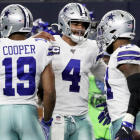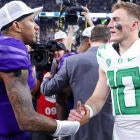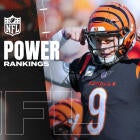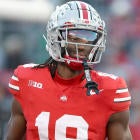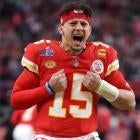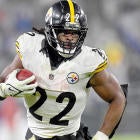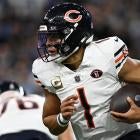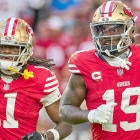Just as we did last year and the year before and the year before that, the crew here at CBSSports.com recently set out to rank each NFL team's "triplets." Why not, right? It's the middle of the offseason and it's difficult to argue that there's any better way to use this space at this time -- especially given everything else going on.
So in the space below, we're counting down the NFL's best QB-RB-WR/TE trios, grading the expected starters at quarterback and running back and their presumed top pass-catcher for the 2020 season. We put a bit of a twist on things this year, tweaking our grading system so that each player is rated on a 1-10 scale (rather than 1-5) and re-weighting the three positions to make quarterbacks even more important.
We began by running through bottom two tiers, comprising the teams ranked 19-32, last week. In the space below, you'll find the top three tiers, comprising teams ranked 1-18. (Note that the teams within each tier are not separated by all that much, making the tiers more meaningful than the pure numbered rankings.)
Tier 3: Average(-ish)
18. Colts (6.70)
Philip Rivers (7), Jonathan Taylor (5), T.Y. Hilton (7)
Based on the way he played last season, this ranking is a bit generous for Rivers, who was seemingly content to put the ball up for grabs on every other throw down the stretch of 2019. But being afforded better pass protection than he has gotten in years should be a big help for one of the league's least mobile quarterbacks, and his familiarity with Frank Reich and Nick Sirianni should ease his transition to a new team.
Taylor is an athletic marvel who ran just about as well as one possibly can run in college, and the Colts did not use a second-round pick on him just to have him play second-fiddle to Marlon Mack. He's not much of a contributor in the passing game, though, which makes him an odd fit for a team that already had an early-down back and that now has a QB who favors dumping it off to the back pretty often. (See: Ekeler, Austin.) Hilton has taken a bit of a step backward, numbers-wise, over the past few years as he has struggled with injuries and subpar quarterback play, so it'll be interesting to see if he can get back to reaching his ceiling with Rivers now under center.
17. Lions (7.00)
Matthew Stafford (7), D'Andre Swift (5), Kenny Golladay (8)
Stafford was on pace for a career-best season at the time he was injured last year: 4,998 yards, 38 touchdowns, and 10 interceptions. He was working on career highs in touchdown rate, yards per attempt, and passer rating, and he was pushing the ball downfield far more often than he had in the recent past. Of course, he got injured, and the Lions' season proceeded to fall apart. He should be surrounded by a similar crew of weapons this year, though, so hopefully he can pick up where he left off.
The Lions spent a second-round pick on Swift, but don't expect them to just hand him a bell-cow job. They've shown no indication of being willing to do anything but split the work between multiple backs, so Kerryon Johnson should be heavily involved. Golladay was right on the bubble for being given a 9 grade here; he's really good, still young, and getting better.
16. Browns (7.05)
Baker Mayfield (6), Nick Chubb (9), Odell Beckham Jr. (8)
Mayfield took a massive step backward last season, crumbling under the weight of truly atrocious offensive line play and coaching. The Browns invested significant resources into the line (Jack Conklin, Jedrick Wills) and swapped out the coaching staff for one more suited to putting Mayfield in position to succeed. Cleveland will be heavy on 12 personnel this year after signing Austin Hooper as well, and that's where Mayfield had his most success as a rookie.
Chubb was terrific last season, one of the true bright spots in an incredibly disappointing campaign for Cleveland. He saw his workload slightly reduced down the stretch after the return of Kareem Hunt, but he was no less effective during that time. Meanwhile, if Beckham's supposedly terrible 2019 season, which he played nagging him and groin injuries and still ended up with a 74-1,035-4 line, is really his floor ... sign me up any day of the week. He should be far better if fully healthy this season.
15. Titans (7.30)
Ryan Tannehill (7), Derrick Henry (9), A.J. Brown (7)
Tannehill led the NFL in yards per attempt and passer rating last season, while completing 70 percent of his passes. He's got almost entirely the same infrastructure around him in 2020, but we can't justify giving him a higher grade than this when last year's performance was so far out of line with his previous career norms. If he somehow manages to do it again, you can expect the Titans to be much, much higher on next year's list.
Henry not getting a 10 grade seems sacrilegious considering his performance last year, but remember that he was pretty dreadful during the first six games of the season when Marcus Mariota was under center. If his performance is that dependent on the quarterback, he's probably not a 10-grade running back in the first place, and that's before we get to his lack of passing-game contribution compared to the other top backs in the league. Brown, meanwhile, will likely see his ridiculous efficiency take a step backward from where it was last season, but he should also see considerably more volume now that he's coming into the year as the established No. 1 passing game target.
14. 49ers (7.45)
Jimmy Garoppolo (7), Raheem Mostert (6), George Kittle (9)
It's incredibly difficult to grade players on the 49ers, simply because their coaching staff puts them in such good position to succeed on an every-snap basis. Garoppolo looks like an above-average quarterback, but Kyle Shanahan also made Nick Mullens look capable for nearly a full season. Mostert was spectacular down the stretch of last season, but we've also seen countless backs reach similar heights in Shanahan's (and his father's) system. Kittle, though, is the best blocking tight end in the league, and also either the best or second-best receiver at the position. He's a superstar, who only gets a 9 grade (rather than 10) here because of the relative value of tight ends compared to wideouts.
Tier 2: Good, But Maybe Not Great
13. Texans (7.50)
Deshaun Watson (9), David Johnson (5), Will Fuller (6)
Watson has been tasked with overcoming one of the NFL's worst offensive lines since he entered the NFL. Now, he'll be tasked with surviving without his top target, DeAndre Hopkins, who was traded in one of the worst deals in recent memory. Watson's talented enough to prop up the rest of this group, but he shouldn't have to.
David Johnson is the second most effective D. Johnson on this team, but it's clear that the Texans, like the Browns before them, have simply pigeonholed Duke Johnson as exclusively a third-down back despite abundant evidence that he can be much more. David Johnson, meanwhile, was last effective in 2016, which is beginning to look a lot more like a career outlier than a true indicator of his talent level. Fuller is a fantastic deep threat, but that's about all he is, and he can't stay on the field. He's perhaps most effective at providing space for other players to operate, as evidence by Watson's significantly better numbers when Fuller himself is on the field.
T-11. Vikings (7.60)
Kirk Cousins (7), Dalvin Cook (9), Adam Thielen (8)
Once the Vikings actually decided to throw the ball last season, Cousins was electric. Minnesota's reliance on a play-action, boot concepts, and targeted deep shots played perfectly to his strengths as a passer, and he had the most efficient season of his career. Former offensive coordinator Kevin Stefanski is now with the Browns, but Gary Kubiak should be able to re-create a similar environment in 2020.
Cook finally stayed healthy for (nearly) a full season, and showed off the full breadth of his skill set while on the field. He's a dynamic, big-play threat as a runner and a receiver, and the Vikings are fortunate enough to have a capable backup they can use to keep Cook's workload manageable. Thielen struggled with injuries last season, but when healthy is one of the league's best slot men. His skill set is an excellent fit for Cousins, who excels at finding play-action targets on the intermediate-depth routes that are Thielen's specialty.
T-11. Cardinals (7.60)
Kyler Murray (7), Kenyan Drake (7), DeAndre Hopkins (9)
Murray's rookie season was extremely encouraging, as he showed the ability to play a point-guard style of quarterback, distributing the ball to a wide variety of targets quickly after the snap. He also showed that he can use his mobility to overcome poor offensive line play, and that his lack of size is not much of an issue when it comes to seeing over the line and/or pushing the ball down the field. He should see positive touchdown regression rate in the future, as only 3.7 percent of his passes went for scores last year.
Drake looked fantastic during his time in Arizona, helping the Cardinals make a leap all the way to second in rushing DVOA. A large majority of that effectiveness came as the result of Kliff Kingsbury's ability to create space by spreading the field, though, and Drake looked downright ordinary during his time in Miami. We need to see more before giving him an elite grade. Hopkins, meanwhile, has a ceiling of "best receiver in the NFL." Whether he can hit that ceiling in Arizona, we'll have to see. His yards per reception average plummeted last season, but much of that was due to the way Houston used him. He should bounce back this yer.
T-9. Steelers (7.70)
Ben Roethlisberger (8), James Conner (6), JuJu Smith-Schuster (8)
At his best, Roethlisberger is one of the best in the NFL. We simply don't know if he can possibly be at his best, though, given the seriousness of his injury and the elbow's importance to his ability to throw. Conner is a versatile back who seems like the perfect kind of modern player, but the Steelers don't seem to value him that way and have given indications they're willing to move on pretty soon. Smith-Schuster's 2019 season can be written off due to the horrid quarterback play he had to deal with, but it'd be nice to see a repeat of his 2018 campaign while he's acting as the team's top target rather than the No. 2.
T-9. Buccaneers (7.70)
Tom Brady (8), Ke'Shawn Vaughn (4), Chris Godwin (9)
Obviously, Brady's ceiling is sky-high. He's likely the best quarterback of all time, and he's working with a better group of weapons than he has in quite some time. But his 2019 season was worrisome, and not it can't all be blamed on the infrastructure around him. We tend to think he'll be just fine in Tampa, but there does seem to be a bit of a gap between him and the very best passers in the league right now, based on what we've seen most recently.
It doesn't feel right to give Vaughn the same grade as running backs who were thought of much more highly than he was coming into the draft, so he gets a 4 grade here. If the Bucs had any confidence in Ronald Jones, they wouldn't have forced the ball to Peyton Barber so often last season, or used a high-value pick on Vaughn on the first place. Godwin and Mike Evans are pretty interchangeable here, as players who are among the small handful of best wideouts in the league. We went with Godwin here because his role in the slot seems likely to make him a favorite of Brady's.
8. Eagles (7.85)
Carson Wentz (8), Miles Sanders (7), Zach Ertz (8)
Even in what was undoubtedly a down season, Wentz was still quite good. He's shown a ceiling of "inner-circle MVP candidate" and the Eagles' efforts to add more speed to their offense should help provide enough space for the kind of short and intermediate throws that are his in-the-pocket strength. Plus, his ability to freelance when things break down always provides an element of unpredictability for this offense. He just needs to stay fully healthy.
Very quietly, Sanders had one of the most effective rookie seasons in recent memory. He became one of just 17 players every to average at least 4.5 yards per carry on at least 150 carries and at least 10 yards per reception on at least 50 receptions -- and only the second rookie (Herschel Walker) to hit each of those marks. Ertz is an extraordinarily consistent receiving option who has recorded at least 70 catches for at least 800 yards in five consecutive seasons. The only tight ends with more such seasons in their entire career are Tony Gonzalez, Jason Witten, and Antonio Gates.
T-6. Packers (8.30)
Aaron Rodgers (8), Aaron Jones (8), Davante Adams (9)
Rodgers has a higher ceiling than just about any quarterback in the league, and until Patrick Mahomes came along, was probably the most talented quarterback I'd ever seen. But his level of play has dipped from its peak of five to six years ago, leaving him just short of the league's elite group of passers. He's still quite good, just not necessarily able to overcome any and all deficiencies in his surroundings, most of which have been well-documented this offseason.
The Packers' reluctance to turn Jones into a true, full-time feature back is now heading into its third season, and it's as confusing now as it's been for the past couple years. After the team invested a second-round pick in A.J. Dillon, it actually wouldn't be surprising if this were Jones' final season in Green Bay. Adams is almost hilariously underrated, and it's a shame the Packers haven't given him some better help on the outside. Why they're seemingly so intent on making things as difficult as possible for him and Rodgers is a true mystery.
T-6. Falcons (8.30)
Matt Ryan (8), Todd Gurley (6), Julio Jones (10)
Ryan is remarkably durable, remarkably productive, and until last season, consistently above average across the board. He took a step backward last season, falling short of league averages in yards per attempt, touchdown rate, and passer rating, each for the first time since 2013. The Falcons had a chance to upgrade his weaponry in the first round this year, but chose to pass on CeeDee Lamb and take a corner instead. We'll see if he's still able to reach his ceiling with only two top-tier wideouts as opposed to three.
Gurley was just cut by the Rams, so even though he was slightly more effective last season than popular consensus would have you believe, we can't justify giving him too high a grade. Jones is arguably the best wideout in football, more efficient on a per-route basis than just about everybody in the league, just about every year. He's also now got 14 touchdowns across the past two seasons, so hopefully we can dispel with the silly notion that he simply cannot score.
Tier 1: Elite
5. Ravens (8.65)
Lamar Jackson (10), Mark Ingram (7), Mark Andrews (7)
Jackson's 2019 season was simply one of a kind, fitting for a player of his skill set. He set the all-time record for rushing yards by a quarterback ... and also led the NFL in touchdown passes and touchdown rate. The concerns that followed him as a passer coming into last season are a thing of the past, and the question now is more about maintaining the consistency of the ceiling he established last season.
Ingram had a strong debut season in Baltimore, but the team felt a need to keep Gus Edwards and Justice Hill involved throughout the year, and recently drafted J.K. Dobbins, so we can't rightly put him among the elite group of backs. Andrews and Jackson were a perfect fit last season, with Andrews' ability to identify and occupy the space behind the linebackers and in front of the safeties mixing perfectly with Baltimore's mixture of heavy personnel and play-action concepts. Despite not playing nearly as many snaps as other top tight ends, he was still among the most productive in the league.
4. Seahawks (8.80)
Russell Wilson (10), Chris Carson (6), Tyler Lockett (8)
OK, so having the Seahawks ahead of the Ravens seems a bit ridiculous. But hear me out.
This ranking isn't about the way these players are utilized, which is a result of coaching more than anything else. Russell Wilson is still one of the best quarterbacks in the league, regardless of his coaching staff's preference for forcing the ball into the hands of running backs more often than not and then counting on Wilson to consistently bail the offense out of bad situations. Carson is nearly as talented as Ingram but the team's reluctance to fully commit to him (as evidenced by taking a running back in the first round and repeatedly signing veterans) led us to give him a lower grade. And is there any doubt that Lockett is a more explosive and efficient target than Andrews? The fact that the Seahawks do not have just as good of an offense as the Ravens is far more a credit to Baltimore's coaching staff (and offensive line) than it is a reflection of anything about this trio.
3. Cowboys (9.00)
Dak Prescott (9), Ezekiel Elliott (9), Amari Cooper (9)
Prescott was an MVP candidate for most of last season, and finished inside the top five in just about every measure of quarterback play. Finally freed to throw as often as other top quarterbacks in the league, Dak revealed a ceiling that the coaching staff had previously been afraid to explore. With the Cowboys keeping creative offensive coordinator in place under Mike McCarthy, Prescott should be afforded a continuity that other quarterbacks transitioning to a new coaching staff don't usually have.
Elliott's combination of durability, physicality, and consistency makes him a good bet to remain productive for at least the first few seasons of his contract. But we already saw last season a dip in his ability to make defenders miss and create splash plays, while backup Tony Pollard looks like the better receiving option moving forward. If Dallas utilizes Pollard in that role, it should help keep Elliott healthy and productive, but could also make the price tag on his extension look even sillier than it does at first glance. Cooper, meanwhile, has been a star since arriving in Dallas. His $100 million extension is really a two-year deal with three team options, though, so if his relative inconsistency continues over these next two years, the Cowboys can choose to cut ties and move forward with Lamb and Michael Gallup as their top two options. He's in a strong position to succeed in the short term, though, so that may not be necessary.
2. Saints (9.30)
Drew Brees (9), Alvin Kamara (9), Michael Thomas (10)
Brees' combination of precision accuracy and quick decision-making is unrivaled in the modern NFL. He sets a new completion percentage record basically every year, and the way he and Thomas work together on slant routes from both the slot and the outside turn throws that typically carry some degree of risk into near-automatic first downs. Kamara would be the best receiving back in the game if not for the existence of Christian McCaffrey, and the Saints do well to manage his workload by employing a power back for certain situations. Still, his dynamism remains a huge part of the team's offense, and the way he excels at making defenders miss can turn the safest of passes into explosive gains.
1. Chiefs (9.40)
Patrick Mahomes (10), Clyde Edwards-Helaire (6), Tyreek Hill (10)
Mahomes is the best quarterback and player in the league. It's that simple. He can make every throw that exists, and some that don't until he conceptualizes and then executes them. He has elite arm strength, elite escapability, elite timing, elite ball placement, elite understanding of defenses, and an elite coaching staff putting him in position to make the kind of easy throws he doesn't actually need to be schemed into, but benefits from nonetheless.
The wisdom of using a first-round pick on a running back should rightly be question, especially when the team that did it has the league's best quarterback and would only be more likely to take the ball out of that player's hands by using such a premium back on a running back. But Edwards-Helaire is a fantastic pass-catcher and perfect fit for this offense. He should be a spectacular fit on the field, and that's what we're evaluating here. Hill is the most explosive receiver in the NFL, a threat to score no matter where on the field the Chiefs have the ball and in what kind of jam he catches it when Mahomes lets fly. The two are as perfect a fit as exists in the league.













